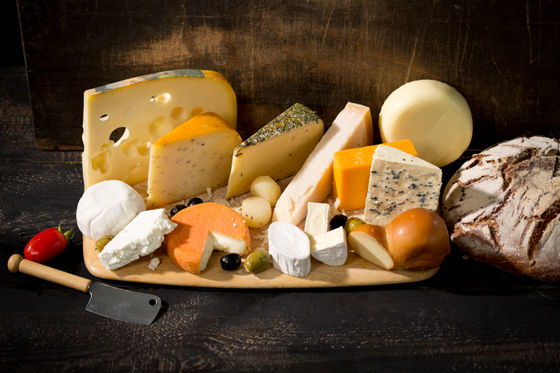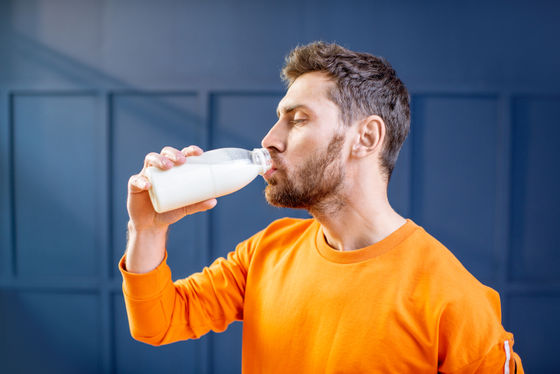After all, is 'milk and dairy products' good or bad for health?

Milk and dairy products: good or bad for human health? An assessment of the totality of scientific evidence - PMC
https://www.ncbi.nlm.nih.gov/pmc/articles/PMC5122229/
The research team of Tanja Kongerslev Thorning, who was a researcher at the Department of Nutrition, Exercise and Sports, Faculty of Science, Copenhagen University at the time, published a paper on November 22, 2016, based on 114 published papers. discussed the relationship between dairy intake and mortality from obesity, type 2 diabetes, cardiovascular disease, osteoporosis, cancer, and all-cause mortality.
·table of contents
◆: Obesity and type 2 diabetes
◆: Cardiovascular disease
◆: Bone health and osteoporosis
◆:Cancer
◆: All-cause mortality
◆: FAQ about milk and health
◆: Obesity and type 2 diabetes
Milk and dairy products are excellent sources of quality protein. Protein also has a satiety effect, which prevents excessive intake of energy and the resulting accumulation of body fat, and helps maintain weight after dieting or weight loss.
However, studies of type 2 diabetes, which is often caused by obesity, have shown that milk and dairy products have little or no association with diabetes risk. .
Based on the results, the research team said, ``A diet rich in milk and dairy products reduces the risk of obesity in children and improves body composition in adults. This probably contributes to reducing the risk of developing type 2 diabetes. Furthermore, dairy consumption during energy restriction promotes weight loss, but the effect of dairy in terms of energy balance is unclear.' The research team also points out that there is increasing evidence that fermented foods such as cheese and yogurt reduce the risk of type 2 diabetes.

◆: Cardiovascular disease
Blood pressure and cholesterol are the most common causes of circulatory diseases such as the heart and lungs. Looking first at blood pressure, low-fat, calcium-rich dairy products are generally thought to lower blood pressure, but no association has been found with high-fat dairy products.
In addition, high-fat dairy products increase both LDL cholesterol, which is sometimes called 'bad cholesterol' because it causes arteriosclerosis, and HDL cholesterol, which is called 'good cholesterol' because it suppresses arteriosclerosis. It is known to get lost. On the other hand, studies show that even among high-fat dairy products, cheese does not raise bad cholesterol as much as would be expected given its high saturated fat content.
A study that directly analyzed the intake of milk and dairy products and the risk of cardiovascular disease found that consuming 200 ml of milk a day reduced the risk of stroke by 7%, and that this effect was more pronounced in Asia than in Europe and the United States. In addition, those who ate a lot of dairy products had a 12% lower risk of cardiovascular disease and a 13% lower risk of stroke than those who ate less or no dairy. It was confirmed.
In this regard, a relatively recent study concluded that ``high consumption of low-fat dairy products is associated with reduced risk of hypertension and stroke,'' which Thorning and colleagues support. doing.

◆: Bone health and osteoporosis
It is said that protein, calcium, phosphorus, magnesium, manganese, zinc, vitamins K and D are necessary for bone building in children and maintaining bones in adults, and milk and dairy products are rich in everything except vitamin D. Included in Especially in women, mineral deficiency during childhood and adolescence is said to significantly increase the risk of bone fractures due to osteoporosis. has been called.
However, the hypothesis that ``a low intake of milk and dairy products in adulthood increases the risk of osteoporosis and fractures'' has not been proven, and it is not supported that milk and dairy products reduce the risk of fractures. Is not ...
Based on these discussions, the research team concludes, ``At present, milk and dairy intake have positive effects on bone health in childhood and adolescence, but there is a significant difference between bone health in adulthood and fracture risk in old age. It has been suggested that there is only limited evidence for

◆:Cancer
Consumption of dairy products has been consistently associated with a lower risk of colorectal and colon cancer, presumably because of the cancer-fighting effects of milk's abundant calcium. It is People who consumed more than 400g of dairy products per day had a lower risk of breast cancer than those who ate less.
On the other hand, in bladder cancer, some meta-analyses show that higher milk intake is associated with a lower risk of bladder cancer, while studies have found no relationship with milk or dairy intake. There was also. In addition, there is a study result that the risk of prostate cancer increases by 3 to 9% with high intake, and it is thought that the effect of dairy products varies depending on the type of cancer.

In relation to colorectal cancer, there is concern about lactose intolerance , which causes symptoms such as gastrointestinal upset when drinking milk. A study focused on this showed that subjects without the ability to synthesize lactase, the enzyme that breaks down lactose, had an increased risk of colon cancer than those without. The research team points out that this means that people with lactose intolerance do not drink milk in the first place, so they did not receive the benefits of suppressing colon cancer. However, no significant association was found between lactose intolerance and prostate cancer risk.
Among other types of cancer, studies have shown that lactose-intolerant subjects have a lower risk of lung, breast, and ovarian cancer, but unfortunately this study is not influenced by factors such as lifestyle and ethnicity. However, it was not very helpful in considering the relationship between lactose intolerant people and dairy products.
From these numerous documents, the research team said, ``Intake of milk and dairy products is probably said to prevent colon cancer, bladder cancer, stomach cancer, and breast cancer. What is the risk of pancreatic cancer, ovarian cancer, and lung cancer? Although apparently unrelated, the evidence on prostate cancer risk is inconsistent, particularly in women, with dairy reducing the risk of serious colorectal cancer and possibly breast cancer. 'There are significant and powerful health benefits, and in men, we may conclude that the benefits of cow's milk in preventing colorectal cancer outweigh the disadvantages of an increased risk of prostate cancer.'
◆: All-cause mortality
Studies examining the relationship between all mortality risks and milk and dairy products have found that some reduce mortality, others show no change, while others show an increase in mortality, with no consistency. is not. A meta-analysis of 12 such studies pooled together also found no consistent association between milk consumption and mortality. Therefore, the research team has confirmed that there is no association between consumption of milk and dairy products and all-cause mortality.

◆: FAQ about milk and health
One of the most frequently asked questions is, 'Is a diet high in milk and dairy products better or worse for the average consumer than a diet low in milk?' 'While dairy consumption is associated with an overall reduced risk of cardiometabolic disease and some cancers, very few side effects have been reported,' the researchers said. Dairy products therefore have the potential to alleviate some of the most common chronic diseases in the population and significantly reduce the health care costs of society.'
Also, to the second question, ``What about people who are lactose intolerant?'' Also, lactose in yogurt is efficiently digested by the action of lactic acid bacteria, so fermented dairy products such as cheese and yogurt do not cause symptoms even if ingested by people with lactose intolerance. No,' he said, even for people with lactose intolerance, if they pay attention to the type and amount of dairy products, there is no problem.
And to the last question, 'Will replacing milk and dairy products with plant-based beverages like soy milk improve health?' There are studies reporting illnesses in children who drank plant-based beverages that are low in protein, but more research is needed before a definitive evidence-based assessment can be made.'
Related Posts:







